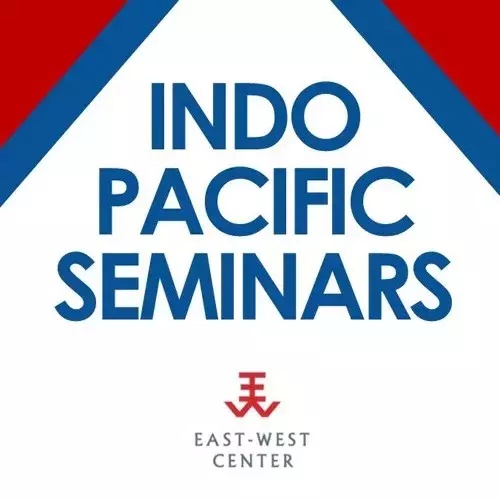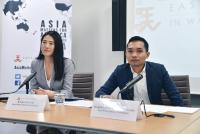Error message

OFFICE/DEPARTMENT
US-Japan Trade Talks & Expanding Private Sector Opportunities in US-Japan-Southeast Asia Economic Relations
An Indo-Pacific Political Economy and Trade Seminar featuring:
Mr. Darren de la Torre Mangado
Visiting Fellow, U.S.-Japan-Southeast Asia Partnership in a Dynamic Asia Fellowship
East-West Center in Washington
Ms. Kyoko Suzuki
Visiting Fellow, U.S.-Japan-Southeast Asia Partnership in a Dynamic Asia Fellowship
East-West Center in Washington
Dr. Ellen L. Frost (Moderator)
Senior Advisor, East-West Center in Washington
The world’s changing geopolitical and -economic environment has called for a re-examination of existing formal and informal international arrangements to accommodate emerging actors and enhance opportunities for international cooperation.

Southeast Asia is proving to be a significant player in international economic affairs. It is emerging as a key market and trade and investment partner for both the US and Japan. However, Southeast Asia suffers from an infrastructure deficit and lags behind in trade competitiveness. To address these issues, the region sponsors various strategies such as the promotion of public-private partnerships (PPPs) and actively engages in discussions of Free Trade Agreements (FTAs).
The US and Japan have responded to these Southeast Asian initiatives with varying degrees of enthusiasm. Nonetheless, the intensified efforts to renew US-Japan economic relations have highlighted the potential for expanding collaborative opportunities not just bilaterally but within the trilateral economic relations of the US, Japan, and Southeast Asia. In this seminar, two fellows of the East-West Center’s U.S-Japan-Southeast Asia Partnership in a Dynamic Asia program surveyed the current trends in PPPs and trade negotiations and examine how these strategies have affected the trilateral relations.
This seminar was part of a series tied to the U.S.-Japan-Southeast Asia Partnership in a Dynamic Asia Fellowship program jointly held by the East West Center and Osaka University’s Osaka School of International Public Policy (OSIPP). Generously funded by The Japan Foundation and US Embassy Tokyo, this fellowship has brought together two American, two Japanese, and two Southeast Asian fellows for three months to explore the following theme: How should the United States, Japan, and Southeast Asia collaborate on trade, investment, and economic integration in Southeast Asia?
For more images, please visit the album for this event on the East-West Center's Flickr page.
Darren de la Torre Mangado recently served as a lecturer of International Studies at De La Salle University Manila. He holds a Master's degree in International Studies from De La Salle University, and in International Public Policy from Osaka University-Osaka School of International Public Policy. His research interests include the international political economy, Southeast Asian regional economic integration, and Japan-Southeast Asia economic relations.
Kyoko Suzuki recently served as an Economic Analyst and Assistant to the Minister-Counselor at the Embassy of Chile in Japan, and as a Special Assistant for Trade Negotiations at the Ministry of Foreign Affairs. She was deeply engaged in the trade negotiations with ASEAN and other Asia-Pacific Countries, such as the Regional Comprehensive Economic Partnership (RCEP), China-Japan-Korea FTA, and the Comprehensive and Progressive Agreement for Trans-Pacific Partnership (CPTPP). Her research focuses on the next US-Japan trade talks and its role in the future cooperation between the United States and Japan, especially in Southeast Asia.
Dr. Ellen L. Frost is a Senior Advisor and Fellow at the East-West Center and a Visiting Distinguished Research Fellow at the National Defense University's Institute of National Strategic Studies. She writes and lectures frequently on Asia-related topics, especially Indo-Pacific political-economic issues and their strategic and security implications. Her most recent book is Asia's New Regionalism. She is also the author of For Richer, For Poorer: The New U.S.-Japan Relationship and Transatlantic Trade: A Strategic Agenda. Dr. Frost previously served in the US government as Counselor to the US Trade Representative, Deputy Assistant Secretary of Defense for International Economic and Technology Affairs, various positions in the Treasury Department and the State Department, and as a legislative assistant in the US Senate. During the 1980s she worked for two multinational corporations. She received a B.A. from Radcliffe College, an M.A. from the Fletcher School of Law and Diplomacy, and a Ph.D. in Government from Harvard University.
US-Japan Trade Talks & Expanding Private Sector Opportunities in US-Japan-Southeast Asia Economic Relations
An Indo-Pacific Political Economy and Trade Seminar featuring:
Mr. Darren de la Torre Mangado
Visiting Fellow, U.S.-Japan-Southeast Asia Partnership in a Dynamic Asia Fellowship
East-West Center in Washington
Ms. Kyoko Suzuki
Visiting Fellow, U.S.-Japan-Southeast Asia Partnership in a Dynamic Asia Fellowship
East-West Center in Washington
Dr. Ellen L. Frost (Moderator)
Senior Advisor, East-West Center in Washington
The world’s changing geopolitical and -economic environment has called for a re-examination of existing formal and informal international arrangements to accommodate emerging actors and enhance opportunities for international cooperation.

Southeast Asia is proving to be a significant player in international economic affairs. It is emerging as a key market and trade and investment partner for both the US and Japan. However, Southeast Asia suffers from an infrastructure deficit and lags behind in trade competitiveness. To address these issues, the region sponsors various strategies such as the promotion of public-private partnerships (PPPs) and actively engages in discussions of Free Trade Agreements (FTAs).
The US and Japan have responded to these Southeast Asian initiatives with varying degrees of enthusiasm. Nonetheless, the intensified efforts to renew US-Japan economic relations have highlighted the potential for expanding collaborative opportunities not just bilaterally but within the trilateral economic relations of the US, Japan, and Southeast Asia. In this seminar, two fellows of the East-West Center’s U.S-Japan-Southeast Asia Partnership in a Dynamic Asia program surveyed the current trends in PPPs and trade negotiations and examine how these strategies have affected the trilateral relations.
This seminar was part of a series tied to the U.S.-Japan-Southeast Asia Partnership in a Dynamic Asia Fellowship program jointly held by the East West Center and Osaka University’s Osaka School of International Public Policy (OSIPP). Generously funded by The Japan Foundation and US Embassy Tokyo, this fellowship has brought together two American, two Japanese, and two Southeast Asian fellows for three months to explore the following theme: How should the United States, Japan, and Southeast Asia collaborate on trade, investment, and economic integration in Southeast Asia?
For more images, please visit the album for this event on the East-West Center's Flickr page.
Darren de la Torre Mangado recently served as a lecturer of International Studies at De La Salle University Manila. He holds a Master's degree in International Studies from De La Salle University, and in International Public Policy from Osaka University-Osaka School of International Public Policy. His research interests include the international political economy, Southeast Asian regional economic integration, and Japan-Southeast Asia economic relations.
Kyoko Suzuki recently served as an Economic Analyst and Assistant to the Minister-Counselor at the Embassy of Chile in Japan, and as a Special Assistant for Trade Negotiations at the Ministry of Foreign Affairs. She was deeply engaged in the trade negotiations with ASEAN and other Asia-Pacific Countries, such as the Regional Comprehensive Economic Partnership (RCEP), China-Japan-Korea FTA, and the Comprehensive and Progressive Agreement for Trans-Pacific Partnership (CPTPP). Her research focuses on the next US-Japan trade talks and its role in the future cooperation between the United States and Japan, especially in Southeast Asia.
Dr. Ellen L. Frost is a Senior Advisor and Fellow at the East-West Center and a Visiting Distinguished Research Fellow at the National Defense University's Institute of National Strategic Studies. She writes and lectures frequently on Asia-related topics, especially Indo-Pacific political-economic issues and their strategic and security implications. Her most recent book is Asia's New Regionalism. She is also the author of For Richer, For Poorer: The New U.S.-Japan Relationship and Transatlantic Trade: A Strategic Agenda. Dr. Frost previously served in the US government as Counselor to the US Trade Representative, Deputy Assistant Secretary of Defense for International Economic and Technology Affairs, various positions in the Treasury Department and the State Department, and as a legislative assistant in the US Senate. During the 1980s she worked for two multinational corporations. She received a B.A. from Radcliffe College, an M.A. from the Fletcher School of Law and Diplomacy, and a Ph.D. in Government from Harvard University.









